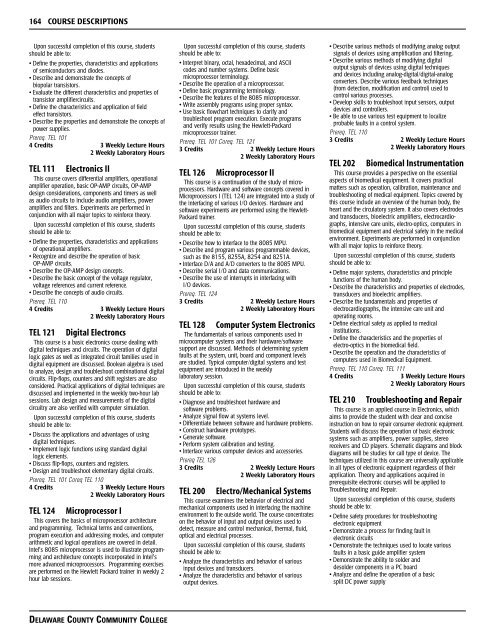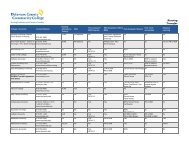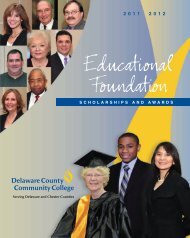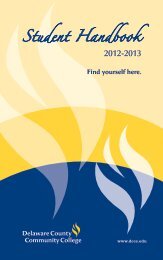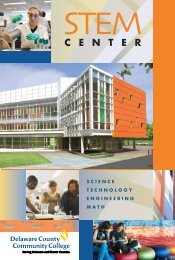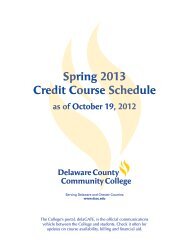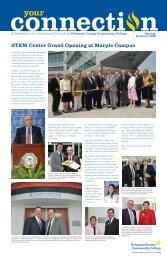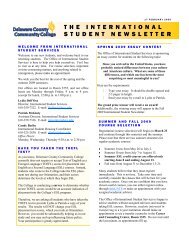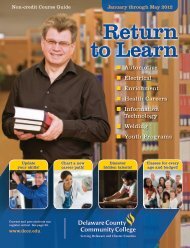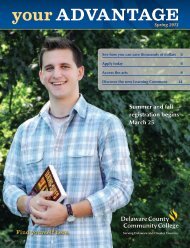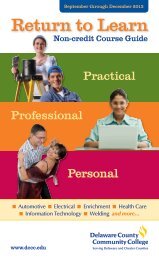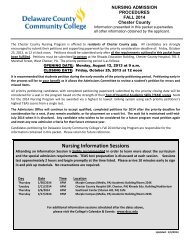2010 Catalog - Delaware County Community College
2010 Catalog - Delaware County Community College
2010 Catalog - Delaware County Community College
Create successful ePaper yourself
Turn your PDF publications into a flip-book with our unique Google optimized e-Paper software.
164 COURSE DESCRIPTIONS<br />
Upon successful completion of this course, students<br />
should be able to:<br />
• Define the properties, characteristics and applications<br />
of semiconductors and diodes.<br />
• Describe and demonstrate the concepts of<br />
biopolar transistors.<br />
• Evaluate the different characteristics and properties of<br />
transistor amplifiercircuits.<br />
• Define the characteristics and application of field<br />
effect transistors.<br />
• Describe the properties and demonstrate the concepts of<br />
power supplies.<br />
Prereq. TEL 101<br />
4 Credits 3 Weekly Lecture Hours<br />
2 Weekly Laboratory Hours<br />
TEL 111<br />
Electronics II<br />
This course covers differential amplifiers, operational<br />
amplifier operation, basic OP-AMP circuits, OP-AMP<br />
design considerations, components and timers as well<br />
as audio circuits to include audio amplifiers, power<br />
amplifiers and filters. Experiments are performed in<br />
conjunction with all major topics to reinforce theory.<br />
Upon successful completion of this course, students<br />
should be able to:<br />
• Define the properties, characteristics and applications<br />
of operational amplifiers.<br />
• Recognize and describe the operation of basic<br />
OP-AMP circuits.<br />
• Describe the OP-AMP design concepts.<br />
• Describe the basic concept of the voltage regulator,<br />
voltage references and current reference.<br />
• Describe the concepts of audio circuits.<br />
Prereq. TEL 110<br />
4 Credits 3 Weekly Lecture Hours<br />
2 Weekly Laboratory Hours<br />
TEL 121<br />
Digital Electroncs<br />
This course is a basic electronics course dealing with<br />
digital techniques and circuits. The operation of digital<br />
logic gates as well as integrated circuit families used in<br />
digital equipment are discussed. Boolean algebra is used<br />
to analyze, design and troubleshoot combinational digital<br />
circuits. Flip-flops, counters and shift registers are also<br />
considered. Practical applications of digital techniques are<br />
discussed and implemented in the weekly two-hour lab<br />
sessions. Lab design and measurements of the digital<br />
circuitry are also verified with computer simulation.<br />
Upon successful completion of this course, students<br />
should be able to:<br />
• Discuss the applications and advantages of using<br />
digital techniques.<br />
• Implement logic functions using standard digital<br />
logic elements.<br />
• Discuss flip-flops, counters and registers.<br />
• Design and troubleshoot elementary digital circuits.<br />
Prereq. TEL 101 Coreq TEL 110<br />
4 Credits 3 Weekly Lecture Hours<br />
2 Weekly Laboratory Hours<br />
TEL 124<br />
Microprocessor I<br />
This covers the basics of microprocessor architecture<br />
and programming. Technical terms and conventions,<br />
program execution and addressing modes, and computer<br />
arithmetic and logical operations are covered in detail.<br />
Intel's 8085 microprocessor is used to illustrate programming<br />
and architecture concepts incorporated in Intel's<br />
more advanced microprocessors. Programming exercises<br />
are performed on the Hewlett Packard trainer in weekly 2<br />
hour lab sessions.<br />
Upon successful completion of this course, students<br />
should be able to:<br />
• Interpret binary, octal, hexadecimal, and ASCII<br />
codes and number systems. Define basic<br />
microprocessor terminology.<br />
• Describe the operation of a microprocessor.<br />
• Define basic programming terminology.<br />
• Describe the features of the 8085 microprocessor.<br />
• Write assembly programs using proper syntax.<br />
• Use basic flowchart techniques to clarify and<br />
troubleshoot program execution. Execute programs<br />
and verify results using the Hewlett-Packard<br />
microprocessor trainer.<br />
Prereq. TEL 101 Coreq. TEL 121<br />
3 Credits 2 Weekly Lecture Hours<br />
2 Weekly Laboratory Hours<br />
TEL 126<br />
Microprocessor II<br />
This course is a continuation of the study of microprocessors.<br />
Hardware and software concepts covered in<br />
Microprocessors I (TEL 124) are integrated into a study of<br />
the interfacing of various I/O devices. Hardware and<br />
software experiments are performed using the Hewlett-<br />
Packard trainer.<br />
Upon successful completion of this course, students<br />
should be able to:<br />
• Describe how to interface to the 8085 MPU.<br />
• Describe and program various programmable devices,<br />
such as the 8155, 8255A, 8254 and 8251A.<br />
• Interface D/A and A/D converters to the 8085 MPU.<br />
• Describe serial I/O and data communications.<br />
• Describe the use of interrupts in interfacing with<br />
I/O devices.<br />
Prereq. TEL 124<br />
3 Credits 2 Weekly Lecture Hours<br />
2 Weekly Laboratory Hours<br />
TEL 128<br />
Computer System Electronics<br />
The fundamentals of various components used in<br />
microcomputer systems and their hardware/software<br />
support are discussed. Methods of determining system<br />
faults at the system, unit, board and component levels<br />
are studied. Typical computer/digital systems and test<br />
equipment are introduced in the weekly<br />
laboratory session.<br />
Upon successful completion of this course, students<br />
should be able to:<br />
• Diagnose and troubleshoot hardware and<br />
software problems.<br />
• Analyze signal flow at systems level.<br />
• Differentiate between software and hardware problems.<br />
• Construct hardware prototypes.<br />
• Generate software.<br />
• Perform system calibration and testing.<br />
• Interface various computer devices and accessories.<br />
Prereq TEL 126<br />
3 Credits 2 Weekly Lecture Hours<br />
2 Weekly Laboratory Hours<br />
TEL 200<br />
Electro/Mechanical Systems<br />
This course examines the behavior of electrical and<br />
mechanical components used in interfacing the machine<br />
environment to the outside world. The course concentrates<br />
on the behavior of input and output devices used to<br />
detect, measure and control mechanical, thermal, fluid,<br />
optical and electrical processes.<br />
Upon successful completion of this course, students<br />
should be able to:<br />
• Analyze the characteristics and behavior of various<br />
input devices and transducers.<br />
• Analyze the characteristics and behavior of various<br />
output devices.<br />
• Describe various methods of modifying analog output<br />
signals of devices using amplification and filtering.<br />
• Describe various methods of modifying digital<br />
output signals of devices using digital techniques<br />
and devices including analog-digital/digital-analog<br />
converters. Describe various feedback techniques<br />
(from detection, modification and control) used to<br />
control various processes.<br />
• Develop skills to troubleshoot input sensors, output<br />
devices and controllers.<br />
• Be able to use various test equipment to localize<br />
probable faults in a control system.<br />
Prereq. TEL 110<br />
3 Credits 2 Weekly Lecture Hours<br />
2 Weekly Laboratory Hours<br />
TEL 202<br />
Biomedical Instrumentation<br />
This course provides a perspective on the essential<br />
aspects of biomedical equipment. It covers practical<br />
matters such as operation, calibration, maintenance and<br />
troubleshooting of medical equipment. Topics covered by<br />
this course include an overview of the human body, the<br />
heart and the circulatory system. It also covers electrodes<br />
and transducers, bioelectric amplifiers, electrocardiographs,<br />
intensive care units, electro-optics, computers in<br />
biomedical equipment and electrical safety in the medical<br />
environment. Experiments are performed in conjunction<br />
with all major topics to reinforce theory.<br />
Upon successful completion of this course, students<br />
should be able to:<br />
• Define major systems, characteristics and principle<br />
functions of the human body.<br />
• Describe the characteristics and properties of electrodes,<br />
transducers and bioelectric amplifiers.<br />
• Describe the fundamentals and properties of<br />
electrocardiographs, the intensive care unit and<br />
operating rooms.<br />
• Define electrical safety as applied to medical<br />
institutions.<br />
• Define the characteristics and the properties of<br />
electro-optics in the biomedical field.<br />
• Describe the operation and the characteristics of<br />
computers used in Biomedical Equipment.<br />
Prereq. TEL 110 Coreq. TEL 111<br />
4 Credits 3 Weekly Lecture Hours<br />
2 Weekly Laboratory Hours<br />
TEL 210<br />
Troubleshooting and Repair<br />
This course is an applied course in Electronics, which<br />
aims to provide the student with clear and concise<br />
instruction on how to repair consumer electronic equipment.<br />
Students will discuss the operation of basic electronic<br />
systems such as amplifiers, power supplies, stereo<br />
receivers and CD players. Schematic diagrams and block<br />
diagrams will be studies for call type of device. The<br />
techniques utilized in this course are universally applicable<br />
in all types of electronic equipment regardless of their<br />
application. Theory and applications acquired in<br />
prerequisite electronic courses will be applied to<br />
Troubleshooting and Repair.<br />
Upon successful completion of this course, students<br />
should be able to:<br />
• Define safety procedures for troubleshooting<br />
electronic equipment<br />
• Demonstrate a process for finding fault in<br />
electronic circuits<br />
• Demonstrate the techniques used to locate various<br />
faults in a basic guide amplifier system<br />
• Demonstrate the ability to solder and<br />
desolder components in a PC board<br />
• Analyze and define the operation of a basic<br />
split DC power supply<br />
DELAWARE COUNTY COMMUNITY COLLEGE


